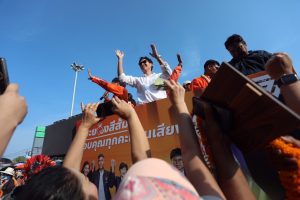ASEAN Beat | Politics | Southeast Asia
The announcement paves the way for parliament to convene in early July, after which it will vote to select the country’s next prime minister.

Pita Limjaroenrat, the leader of Thailand’s Move Forward Party, greets supporters in Chonburi, Thailand, May 21, 2023.
Credit: Twitter/MFPThailand
Thailand’s Election Commission has verified the results of last month’s general election, paving the way for the elected parliamentarians to convene and select the country’s next prime minister in mid-July.
Speaking to reporters in Bangkok yesterday, EC Secretary General Sawaeng Boonmee said that his agency had verified the election of the 500 elected members of the House of Representatives, including 400 representing constituencies and 100 elected from party lists.
Under Thai law, the elected lawmakers must convene in Parliament within 15 days, or by July 3, after which a joint session of parliament will convene to select the house speaker and prime minister in mid-July. The country’s protracted post-election interregnum will then come to an end with the swearing-in of the new government in late July.
Sawaeng said that the EC was still considering various complaints related to the May 14 poll, which he said could not be completed within the 60 days granted to the agency to confirm the election results. He said that these outstanding investigations “must be completed within one year after the announcement of the electoral results.” If there is credible evidence of electoral fraud involving any of the endorsed lawmakers, Sawaeng added, the EC can request that the Supreme Court revoke their electoral rights and, if necessary, call a new election.
Diplomat Brief
Weekly Newsletter
N
Get briefed on the story of the week, and developing stories to watch across the Asia-Pacific.
Get the Newsletter
That has implications for the victorious Move Forward Party (MFP), which prevailed in the election, winning 151 seats in the 500-seat House of Representatives, just ahead of the opposition Pheu Thai Party, which clinched 141 seats. Both far outperformed the ruling pro-military Palang Pracharath Party, which managed just 40 seats, and Prime Minister Prayut Chan-o-cha’s United Thai Nation Party, which emerged with 36, dealing a blow against the country’s conservative ruling establishment.
However, the MFP, whose policies take aim at entrenched political and economic interests, faces a number of obstacles to its ambition of forming Thailand’s next government and ending a nearly decade-long period of military and military-backed rule.
The main hurdle is the country’s unelected 250-member Senate, which will vote along with the House of Representatives to form the next government, ensuring that any party or coalition wishing to form government requires 376 votes rather than a simple House majority of 251. The eight-party coalition led by the MFP holds just 312 seats, meaning that it will need to win the support of 65 military-appointed senators, or House lawmakers from conservative parties, in order to form government.
The MFP’s leader Pita Limjaroenrat also faces an EC investigation into whether he registered for the election knowing that he could be disqualified for holding shares in iTV, a defunct television broadcaster.
Advertisement
The fact that the EC could rule on this any time between now and next May creates an additional mechanism by which the MFP victory could potentially be subverted. Even if Pita succeeds in being elected Thailand’s next prime minister, the investigation will cast a much longer shadow of uncertainty over his government’s fortunes.

